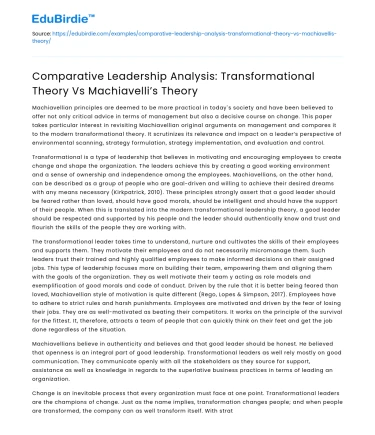Machiavellian principles are deemed to be more practical in today`s society and have been believed to offer not only critical advice in terms of management but also a decisive course on change. This paper takes particular interest in revisiting Machiavellian original arguments on management and compares it to the modern transformational theory. It scrutinizes its relevance and impact on a leader’s perspective of environmental scanning, strategy formulation, strategy implementation, and evaluation and control.
Transformational is a type of leadership that believes in motivating and encouraging employees to create change and shape the organization. The leaders achieve this by creating a good working environment and a sense of ownership and independence among the employees. Machiavellians, on the other hand, can be described as a group of people who are goal-driven and willing to achieve their desired dreams with any means necessary (Kirkpatrick, 2010). These principles strongly assert that a good leader should be feared rather than loved, should have good morals, should be intelligent and should have the support of their people. When this is translated into the modern transformational leadership theory, a good leader should be respected and supported by his people and the leader should authentically know and trust and flourish the skills of the people they are working with.
Save your time!
We can take care of your essay
- Proper editing and formatting
- Free revision, title page, and bibliography
- Flexible prices and money-back guarantee
The transformational leader takes time to understand, nurture and cultivates the skills of their employees and supports them. They motivate their employees and do not necessarily micromanage them. Such leaders trust their trained and highly qualified employees to make informed decisions on their assigned jobs. This type of leadership focuses more on building their team, empowering them and aligning them with the goals of the organization. They as well motivate their team y acting as role models and exemplification of good morals and code of conduct. Driven by the rule that it is better being feared than loved, Machiavellian style of motivation is quite different (Rego, Lopes & Simpson, 2017). Employees have to adhere to strict rules and harsh punishments. Employees are motivated and driven by the fear of losing their jobs. They are as well-motivated as beating their competitors. It works on the principle of the survival for the fittest. It, therefore, attracts a team of people that can quickly think on their feet and get the job done regardless of the situation.
Machiavellians believe in authenticity and believes and that good leader should be honest. He believed that openness is an integral part of good leadership. Transformational leaders as well rely mostly on good communication. They communicate openly with all the stakeholders as they source for support, assistance as well as knowledge in regards to the superlative business practices in terms of leading an organization.
Change is an inevitable process that every organization must face at one point. Transformational leaders are the champions of change. Just as the name implies, transformation changes people; and when people are transformed, the company can as well transform itself. With strategies such as clear vision and trust, it can provide direction to their employees with predefined goals. This leadership style offers direction to the people from top to bottom as they develop a conducive working environment and culture (Shapira, 2019). In terms of change, Machiavellian believes that change is a process and is not a one-time event. It is therefore hard for people to believe in something they do not know. He, therefore, believes that is it equally important that change comes with a lot of resistance as it alters the power dynamics across the organization's boundaries. To reduce the level of resistance, it is therefore important to build support.
Both leadership style may impact a leader`s perspective of environmental scanning, strategy formulation, strategy implementation, and evaluation and control. A good leader should always develop an effective course and direction for their team with a strategic agenda. The acquisition of these characteristics forms the part of a transformational leader as it places emphasis on monitoring and evaluating external opportunities. Transformational leaders are vision-oriented and as such, before embarking on any venture, they always evaluate the market environment using different strategies such as pestle, Porter’s five and SWOT framework to determine the profitability of the new venture (Kirkpatrick, 2010). They focus more on identifying the best solution for any problem. These leaders shift the power of decision-making to their employees and this consequently inspires employees to come up with new ideas. This creates intellectual stimulation among employees as well as giving them more room to be creative. They then formulate an effective strategy as they implement it. Such leaders implement change by developing ways to collaborate with their team.
Machiavellian leadership theory, however, believes that the implementation of change is dangerous since one is met with a lot of resistance and opposition. Therefore, for one to succeed, change needs support and ownership and courage. Implementing innovative strategies, therefore, require a lot of collaboration, research, and consensus from people. As a result, for any leader to be able to implement, they need to convince their followers through proper scanning of the environment and successfully evaluating and monitoring control.






 Stuck on your essay?
Stuck on your essay?

